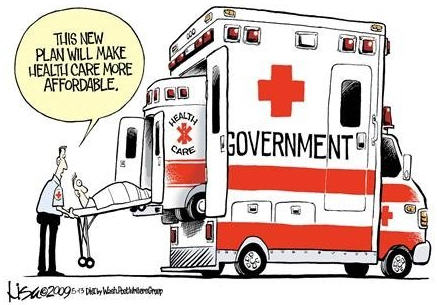Obama Health Care = Bush Social Security
Patrick Ruffini has used considerably fewer than 140 characters to make an interesting point: “Obama Health Care = Bush Social Security.”
The analogy is a strong one.
 You will recall that President George W. Bush, fresh off re-election in 2004 pledged to use his “political capital” to pass a major reform of the Social Security system that included a private option. Despite having a Republican majority in both Houses of Congress, the deal fell apart owing to united opposition from the Democrats and division among the Republicans.
You will recall that President George W. Bush, fresh off re-election in 2004 pledged to use his “political capital” to pass a major reform of the Social Security system that included a private option. Despite having a Republican majority in both Houses of Congress, the deal fell apart owing to united opposition from the Democrats and division among the Republicans.
Fast forward four years and we seem to be having a re-run. Fresh off a historic election, President Obama pledged a massive reform of the health care system that included a public option. Despite having a Democratic majority in both Houses of Congress, the deal seems to be falling apart owing to united opposition from the Republicans and division among the Democrats.
Rick Moran argues that “Obamacare” is floundering because Obama is taking his leadership cues from Jimmy Carter.
This president apparently doesn’t know how to govern. He has handed responsibility for getting this bill passed to Pelosi and Reid while he stands on the sidelines kibitzing.
Bottom line: No one is in charge. Committee chairmen have their own ideas about what should be in the bill while Blue Dogs and liberals are rejecting their formulations and want to substitute massively.
Then again, Bush had a plan and allowed himself to be the target of public criticism and still failed miserably. It may simply be that massive reform efforts are ridiculously hard, especially once there’s an actual bill to shoot at. There may be mass agreement in theory that we need to Do Something about the problem but there’s much less consensus on What To Do about said problem. Republicans are mostly against the effort, both for ideological reasons and because killing Obamacare would seriously wound Obama politically. Democrats, meanwhile, are going to either be disappointed that the bill doesn’t go far enough or think it goes to far.






I’m not sure the analogy is correct.
First, I think people voted for Bush despite (or in ignorance) of his position on privatizing social security.
Second, Obama has been hit sideways by economic events that weren’t anticipated until months before he entered office. He’s been forced to make a case that healthcare reform is good fiscal policy to calm nervous legislators.
I think overreach is the problem here. I could say a massive reform of social security is also overreach.
I think the key here is that while many people think healthcare needs fixing, they don’t want a whole new system.
I think Obama would do much better to reform healthcare in baby steps. Fix the problems in medicare and the VA system. Figure out a way to bridge the gap between the uninsured and the insured. Figure out a way to get more doctors trained each year-especially in primary care specialties and get those doctors into rural/underserved areas.
I think all three of these would go a long way to making most people happy, but instead we have this plan that forces everyone to buy insurance, makes it questionable as to what kind of insurance a person will have once it is implemented (will I get to keep my plan or will it change to something else-perhaps something that is worse than what I have now?) and it appears to come with a huge price tag.
PD,
Bush ran on his policies. you may not have agreed with his position on Iraq, social security, etc. but you wouldn’t be surprised.
Obama as president is not treating his campaign promises with as much respect due used toilet paper. As an example his promise that every increase in spending would be matched by a spending cut vs his running up more debt in one year than Bush did in 6 years. Or a variety of war on terrorism positions during the campaign vs the reality of the world while governing.
In theory Obama should have a stronger position as the democrats not only have a majority, but don’t need republicans to agree to end debate in the senate.
I think the real issue is that with the Bush social security, there were legitimate concerns whether the proposed solution would solve the problem. I have yet to hear anyone make more than a hand waving case that anything on the Obama proposal would actually reduce health care costs except at the expense of patient treatment. So other than wanting to do “something” there is no strong reason to go with Obama. The result, like with Obama’s stimulus slush fund is every porker is trying to get their snout in the trough and that makes an unappealing meal even worse.
I would also point out that Clinton took the opposite tack of “hands off” on health care and he went down in flames also.
The good news is that the more the left tries to remake America, the more likely America will recognize the left for what they are get rid of them. I just wish the Republicans would re-discover their roots so they would be in a better position to capitalize and govern.
There’s another big difference. Even years later Social Security can still be fixed with a little tweaking around the edges, much as we have previously. The clock is ticking on healthcare reform and unless the bomb disposal squad disarms it soon it will explode over all of us. There’s real urgency on healthcare reform and it will take a major overhaul.
I think Rick is warm, but not hot.
What’s going on here is Obama is looking for a way to push this stuff throuhg withotut the need to take the blame for it if it doesn’t go through or if it fails.
Want to reform healthcare? Get government out of it. Not only will it reduce costs and increase competition, but it will do so without having to play budget God so as to buy votes from various constituancies.
But of course the one solution that will work is the one he’s not going to attempt.
What’s going on here is Obama is looking for a way to push this stuff throuhg withotut the need to take the blame for it if it doesn’t go through or if it fails.
I think this is probably true. If Obama lets congress write the bill, he can push the blame to them if it fails. Obama doesn’t seem to care much for putting his own neck on the line.
I also think the problem with reforming anything-Americans don’t like radical change-especially if it comes with a huge price tag and may not work. And this is radical change and the plans so far don’t seem to show that they will even fix the problems-and I think opposition is tied up in thinking their healthcare is too expensive think the Obama plan will make it more expensive.
Keep in mind that he’s more or less dependent on his congressional leaders to get this going – it’s not as if Obama can go down into Congress himself and do the vote-trading. He can put pressure, and offer incentives, but that’s about it.
And after healthcare, the administration can address the luxury car crisis. It isn’t fair that not everyone can drive a Lexus LS, or an Infiniti G37, or a BMW 7 series, or a new Government Motors 6000 SUX.
But seriously, instead of this massive overhaul with all its unintended consequencea, why not set aside $100B a year to set up “free” governement clinics where anyone can go and be treated. They can even focus on preventative care to see just how well that would work out. This would generate some excellent data to analyze and determine just what might work and what might not without screwing up what already works for a lot of folks.
Obama’s health care reform is going to be an utter complete failure.
1. It doens’t pass and we really need some serious and helpful reform–note the current legislation is NOT it. So Obama is wasting political capital on crap.
2. It does pass, and as noted above is complete junk. Spending $600 billion in new spending when we are supposed to be saving money is not the right track. It is precisely the wrong track.
No matter what happens President Obama will be a failure on this part and it will most likely hurt all of us. We will be directing even more resources towards health care using up scarce resources. This will,
A. Push up the cost of health care.
B. Push up the growth rate in the cost of health care.
C. If there are diminishing returns the results we get from all this extra spending will be incrementally smaller.
D. Since we have limited resources the more going into health care means less going into other productive activities.
A – D imply that we will have lower economic output overall, that is we will have an economic “pie” that, at best, will be growing at a slower rate. This will only make the situation even more untenable.
Oh, and Obama lied. Obama said during the campaign that those making over $250,000/year wont see thier income taxes go above the Clinton era tax rate. They are heading above that tax rate and who knows where it will stop.
All of this at a time when we need economic growth. It is bad fiscal policy, bad health policy, bad economic policy. Its just bad. Reform is abosultely needed. Moving to a system like the French or Dutch systems would be a good start, but we aren’t doing that. We are doing it more along the lines of the British or Canadian systems and those are bad systems.
That’s not enough, unless you mean to the extent that government doesn’t regulate who can and cannot practice medicine, what procedures they can and cannot use, and what drugs they can and cannot prescribe.
Michael, add to your list of government interventions deciding who can make or sell a particular drug or device.
Government out of healthcare is about as dystopic an idea as I’ve heard lately. The sad truth is much, much harder. We’ve got to use prudence and good judgment, always in short supply, to decide how and where medicine should be regulated and/or subsidized. That’s not as appealing as bumper sticker solutions.
I do indeed mean that, but would suggest that event the smaller step toward a free market would be one in the proper direction, and would reap benefits.
I agree with Dave, that’s not a world I want to go back to. Healthcare is better now than when it was unregulated.
It seems to me that most polling data shows much more support for Health Care reform than there was for Social Security Privatization so perhaps the comparison is irrelevant.
So it would be better to do it the way the Clintons tried to do it? That worked out so well for them…
Oh really? So what about a “humble foreign policy” and “no nation building”?
And, um, when have Republicans ever been in power and followed their “roots” in governing? I notice that when they held power, no cabinet departments were abolished, no budgets were balanced, and neither government nor spending were shrunk…conservatives seem to be living in some sort of dream world…all this talk of government getting out of this and government getting out of that…if not even the GOP will do that, who do you think will…
Really? Then, what’s the crisis about, if we’re in good shape?
Nice straw man. I said I don’t want a situation that is worse than the current one. That in no way implies that the current situation is good.
Would you like to live in a world where we just euthanize sick people? No? Does that mean you’re happy with the current situation? I didn’t think so.
Hardly. It’s a serious question, and one most people seem to be devoutly avoiding. The reason they do so is because to address the question seriously, implies actually answering it:
Healthcare costs have gone up, exponentially as government involvement in healthcare has gone up. Government’s solution to the cost problem, of course, is more government involvement. Gee, that’ll work, huh?
What amazes me is the number of idiots who accept this illogic.
Will government end up out of healthcare totally? Likely not, for a number of reasons. But until we start seriously looking at the cost/benefit realtionship of governmental involvement, so long as we never allow ourselves to even consider lowering government’s role in it.. when every soluton is giving government more power, we’re never going to solve the problem, without rationing of healthcare services, and people thereby dying on the government’s unwillingness to allow some procedures.
And so we end up at the location you state you want to avoid…. where we where we just euthanize sick people because it simply costs the government too much.
I’d like to see some data on that. Government has been involved in healthcare for a very long time, and I don’t believe it’s involvement has increased in the last two decades in any way proportional to the increase in the cost of healthcare.
But that is not my solution. Don’t take my opposition to anarcho-capitalism to mean that I support socialism.
So then you think our current situation is okay? Here, you can have your strawman back.
Then, read.
Not only no, but HELL no. Thing is, government isn’t the solution to that issue, any more than a little poison is the cure for the illness.
The graph shows a steady increase in the cost of healthcare, marking points of increased government intervention, but showing no associated spike in the cost of health care. It shows no hint of government involvement effecting the cost of healthcare one way or another.
The growth of healthcare costs as % of GDP seems to have enjoyed a constant increase since 1960 (as far back as the graph goes), with only a plateau in the mid to late 1990s breaking the trend.
The effects on the more complex cost structures in things like healthcare are never immediate, and are always accumulative.
At the very least, if the trends are unbroken as you say, it would seem that governmental involvement has not done thing one about lowering costs. hmmm?
There’s also the idea of comparing costs vs government involvement in other commidties. Energy leaps to mind. In fact, let me propose you go searching for anything that government has gotten involved with where costs have not risen as a direct result of governental involvement, and get back to us with what you find.
Even if we assume that is true, there is no evidence for it in the graph given.
Right, something I stated in my previous post.
That’s not a very good idea. Firstly, healthcare isn’t really a commodity, nor is it comparable to any commodity.